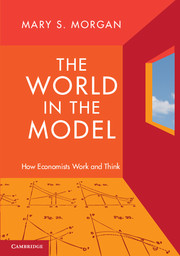Book contents
- Frontmatter
- Contents
- Figures, Tables, and Boxes
- Preface
- 1 Modelling as a Method of Enquiry
- 2 Model-Making: New Recipes, Ingredients, and Integration
- 3 Imagining and Imaging: Creating a New Model World
- 4 Character Making: Ideal Types, Idealization, and the Art of Caricature
- 5 Metaphors and Analogies: Choosing the World of the Model
- 6 Questions and Stories: Capturing the Heart of Matters
- 7 Model Experiments?
- 8 Simulation: Bringing a Microscope into Economics
- 9 Model Situations, Typical Cases, and Exemplary Narratives
- 10 From the World in the Model to the Model in the World
- Index
- Plate Section
Preface
Published online by Cambridge University Press: 05 November 2012
- Frontmatter
- Contents
- Figures, Tables, and Boxes
- Preface
- 1 Modelling as a Method of Enquiry
- 2 Model-Making: New Recipes, Ingredients, and Integration
- 3 Imagining and Imaging: Creating a New Model World
- 4 Character Making: Ideal Types, Idealization, and the Art of Caricature
- 5 Metaphors and Analogies: Choosing the World of the Model
- 6 Questions and Stories: Capturing the Heart of Matters
- 7 Model Experiments?
- 8 Simulation: Bringing a Microscope into Economics
- 9 Model Situations, Typical Cases, and Exemplary Narratives
- 10 From the World in the Model to the Model in the World
- Index
- Plate Section
Summary
Preface
Science is messy. Historians write seamless accounts to make it comprehensible, and in doing so, sometimes paper over the knots and holes in scientific life. Philosophers provide sparely argued analyses of scientific method, and in doing so may avoid the many awkward rubs of detail. This book is not such a monograph: It offers neither a continuous historical narrative nor a fortified philosophy of modelling. Yet, its ambition is to offer both a history of the naturalization of modelling in economics and a naturalized philosophy of science for economics. And it does so in the spirit of those many others who eschew smoothness.
So – this book is not a conventional monograph. It is a series of historical case studies through which the philosophical commentary runs. I have long described it as a kind of travel guide: I present, as three-star tourist sites, some of the best known, and historically significant, models in economics, and use each as the basis upon which to fashion a philosophical commentary about the nature of modern economics. But readers might also find this book something like a detective’s casebook: my series of investigations, as I follow the clues and fit them together, to make sense of what economic modelling is all about. Case studies are the best way that I know to figure out how science goes on. Cases not only form individual stories that capture the practices of economic science in considerable depth, but taken together they provide the materials for a broader account of how economics became, and works, as a modelling science. The messy details are important – not just because, as we know, bald narratives lack credibility, but rather because the devil is often in the detail, and thus larger, and important, matters cannot be understood and explained without them. After all, what would detective novels be if the clues were omitted as mere detail to the argument?
- Type
- Chapter
- Information
- The World in the ModelHow Economists Work and Think, pp. xv - xviiiPublisher: Cambridge University PressPrint publication year: 2012



